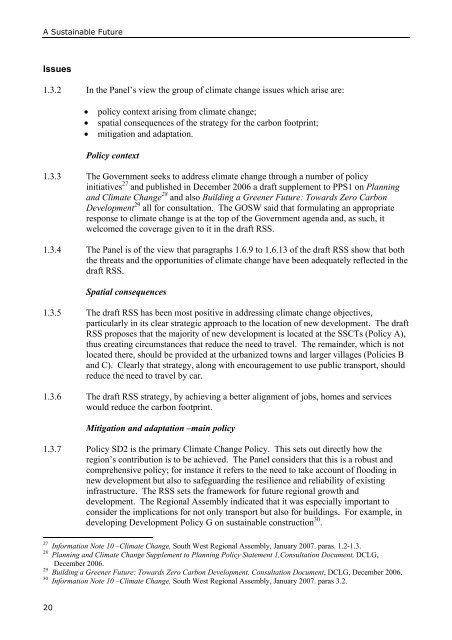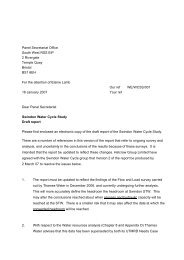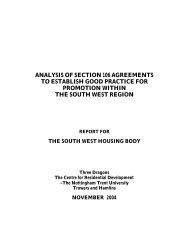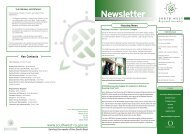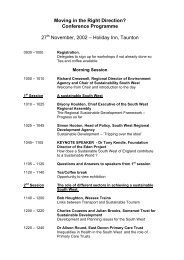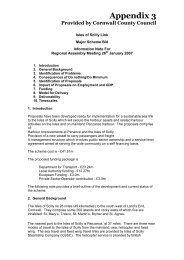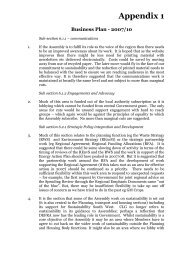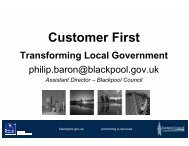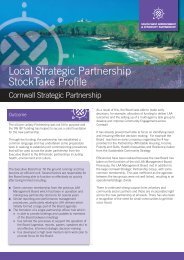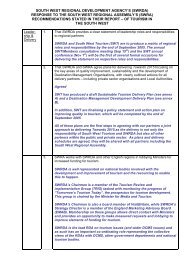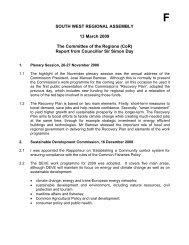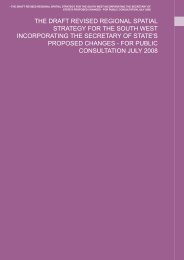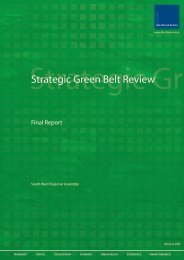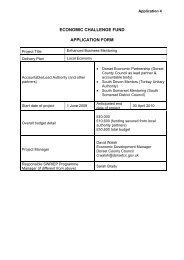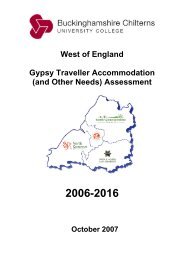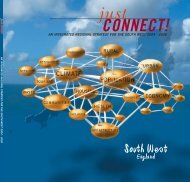- Page 1: Examination in Public April - July
- Page 5 and 6: Draft RSS for the South West: Panel
- Page 7 and 8: Draft RSS for the South West: Panel
- Page 9 and 10: Draft RSS for the South West: Panel
- Page 11 and 12: Draft RSS for the South West: Panel
- Page 13 and 14: Draft RSS for the South West: Panel
- Page 15 and 16: Overview and Summary Chapter 0: Ove
- Page 17 and 18: Overview and Summary 0.13 As noted
- Page 19 and 20: Overview and Summary in 2007. We co
- Page 21 and 22: Overview and Summary 0.43 There is
- Page 23 and 24: Overview and Summary Economy and Em
- Page 25 and 26: A Sustainable Future Chapter 1: A S
- Page 27 and 28: A Sustainable Future 1.0.13 Policie
- Page 29 and 30: A Sustainable Future environment, b
- Page 31 and 32: A Sustainable Future 1.2.7 There ar
- Page 33: A Sustainable Future • The text s
- Page 37 and 38: Context for Spatial Strategy Chapte
- Page 39 and 40: Context for Spatial Strategy employ
- Page 41 and 42: Context for Spatial Strategy the no
- Page 43 and 44: Context for Spatial Strategy 2.24 I
- Page 45 and 46: Context for Spatial Strategy such a
- Page 47 and 48: The Spatial Strategy Chapter 3: The
- Page 49 and 50: The Spatial Strategy improving conn
- Page 51 and 52: The Spatial Strategy • Modify par
- Page 53 and 54: The Spatial Strategy various Joint
- Page 55 and 56: The Spatial Strategy 3.30 Against t
- Page 57 and 58: The Spatial Strategy countryside an
- Page 59 and 60: The Spatial Strategy areas of rural
- Page 61 and 62: The Spatial Strategy of the policy
- Page 63 and 64: Overview - Housing Market Areas Sub
- Page 65 and 66: Overview - Housing Market Areas Sub
- Page 67 and 68: Overview - Housing Market Areas Sub
- Page 69 and 70: Overview - Housing Market Areas Sub
- Page 71 and 72: Overview - Housing Market Areas Sub
- Page 73 and 74: Overview - Housing Market Areas Sub
- Page 75 and 76: West of England HMA Sub-Regional St
- Page 77 and 78: West of England HMA Sub-Regional St
- Page 79 and 80: West of England HMA Sub-Regional St
- Page 81 and 82: West of England HMA Sub-Regional St
- Page 83 and 84: West of England HMA Sub-Regional St
- Page 85 and 86:
West of England HMA Sub-Regional St
- Page 87 and 88:
West of England HMA Sub-Regional St
- Page 89 and 90:
West of England HMA Sub-Regional St
- Page 91 and 92:
West of England HMA Sub-Regional St
- Page 93 and 94:
Swindon HMA Sub-Regional Strategy 4
- Page 95 and 96:
Swindon HMA Sub-Regional Strategy R
- Page 97 and 98:
Swindon HMA Sub-Regional Strategy E
- Page 99 and 100:
Swindon HMA Sub-Regional Strategy n
- Page 101 and 102:
Swindon HMA Sub-Regional Strategy p
- Page 103 and 104:
Gloucester and Cheltenham HMA Sub-R
- Page 105 and 106:
Gloucester and Cheltenham HMA Sub-R
- Page 107 and 108:
Gloucester and Cheltenham HMA Sub-R
- Page 109 and 110:
Gloucester and Cheltenham HMA Sub-R
- Page 111 and 112:
Gloucester and Cheltenham HMA Sub-R
- Page 113 and 114:
Gloucester and Cheltenham HMA Sub-R
- Page 115 and 116:
Gloucester and Cheltenham HMA Sub-R
- Page 117 and 118:
Gloucester and Cheltenham HMA Sub-R
- Page 119 and 120:
Exeter HMA Sub-Regional Strategy 4/
- Page 121 and 122:
Exeter HMA Sub-Regional Strategy Ne
- Page 123 and 124:
Exeter HMA Sub-Regional Strategy Re
- Page 125 and 126:
Exeter HMA Sub-Regional Strategy 4.
- Page 127 and 128:
Exeter HMA Sub-Regional Strategy 30
- Page 129 and 130:
Torbay HMA Sub-Regional Strategy 4/
- Page 131 and 132:
Torbay HMA Sub-Regional Strategy bu
- Page 133 and 134:
Torbay HMA Sub-Regional Strategy Co
- Page 135 and 136:
Taunton HMA Sub-Regional Strategy 4
- Page 137 and 138:
Taunton HMA Sub-Regional Strategy 4
- Page 139 and 140:
Taunton HMA Sub-Regional Strategy 4
- Page 141 and 142:
Taunton HMA Sub-Regional Strategy d
- Page 143 and 144:
Taunton HMA Sub-Regional Strategy 4
- Page 145 and 146:
Bournemouth and Poole HMA Sub-Regio
- Page 147 and 148:
Bournemouth and Poole HMA Sub-Regio
- Page 149 and 150:
Bournemouth and Poole HMA Sub-Regio
- Page 151 and 152:
Bournemouth and Poole HMA Sub-Regio
- Page 153 and 154:
Bournemouth and Poole HMA Sub-Regio
- Page 155 and 156:
Bournemouth and Poole HMA Sub-Regio
- Page 157 and 158:
Bournemouth and Poole HMA Sub-Regio
- Page 159 and 160:
Bournemouth and Poole HMA Sub-Regio
- Page 161 and 162:
4/8 Plymouth HMA Sub-Regional Strat
- Page 163 and 164:
Plymouth HMA Sub-Regional Strategy
- Page 165 and 166:
Plymouth HMA Sub-Regional Strategy
- Page 167 and 168:
West Cornwall HMA Sub-Regional Stra
- Page 169 and 170:
West Cornwall HMA Sub-Regional Stra
- Page 171 and 172:
West Cornwall HMA Sub-Regional Stra
- Page 173 and 174:
West Cornwall HMA Sub-Regional Stra
- Page 175 and 176:
Polycentric Devon & Cornwall HMA Su
- Page 177 and 178:
Polycentric Devon & Cornwall HMA Su
- Page 179 and 180:
Polycentric Devon & Cornwall HMA Su
- Page 181 and 182:
4/11 Salisbury HMA Sub-Regional Str
- Page 183 and 184:
Salisbury HMA Sub-Regional Strategy
- Page 185 and 186:
Salisbury HMA Sub-Regional Strategy
- Page 187 and 188:
Weymouth & Dorchester HMA Sub-Regio
- Page 189 and 190:
Weymouth & Dorchester HMA Sub-Regio
- Page 191 and 192:
Weymouth & Dorchester HMA Sub-Regio
- Page 193 and 194:
South Somerset HMA Sub-Regional Str
- Page 195 and 196:
South Somerset HMA Sub-Regional Str
- Page 197 and 198:
South Somerset HMA Sub-Regional Str
- Page 199 and 200:
Broad Housing Distribution 4/14 Bro
- Page 201 and 202:
Broad Housing Distribution 4.14.11
- Page 203 and 204:
Transport Chapter 5: Transport Matt
- Page 205 and 206:
Transport becoming increasingly unr
- Page 207 and 208:
Transport 5.17 Policy SD4, which de
- Page 209 and 210:
Transport charging. This is in the
- Page 211 and 212:
Transport the one hand with the mor
- Page 213 and 214:
Transport Exeter to Plymouth and Pe
- Page 215 and 216:
Transport 5.49 We recognise that th
- Page 217 and 218:
Transport Authorities claim that th
- Page 219 and 220:
Transport operation and reliability
- Page 221 and 222:
Transport Recommendation 5.9 • Mo
- Page 223 and 224:
Transport should be placed on capac
- Page 225 and 226:
Housing Chapter 6: Housing Matter 6
- Page 227 and 228:
Housing promote increased provision
- Page 229 and 230:
Housing situations should be addres
- Page 231 and 232:
Housing to the region as a whole an
- Page 233 and 234:
The Environment and Resource Manage
- Page 235 and 236:
The Environment and Resource Manage
- Page 237 and 238:
The Environment and Resource Manage
- Page 239 and 240:
The Environment and Resource Manage
- Page 241 and 242:
The Environment and Resource Manage
- Page 243 and 244:
The Environment and Resource Manage
- Page 245 and 246:
Economy and Employment Chapter 8: E
- Page 247 and 248:
Economy and Employment require furt
- Page 249 and 250:
Economy and Employment concerning t
- Page 251 and 252:
Economy and Employment accessibilit
- Page 253 and 254:
Economy and Employment the Statemen
- Page 255 and 256:
Economy and Employment conclude tha
- Page 257 and 258:
Economy and Employment • how incr
- Page 259 and 260:
Economy and Employment substantial
- Page 261 and 262:
Implementation and Monitoring Chapt
- Page 263 and 264:
Implementation and Monitoring aware
- Page 265 and 266:
Implementation and Monitoring categ
- Page 267 and 268:
Implementation and Monitoring regio
- Page 269 and 270:
Implementation and Monitoring 9.31
- Page 271 and 272:
Glossary Glossary Abbreviations Ter
- Page 273:
Examination in Public April - July
- Page 277 and 278:
Draft RSS for the South West: Panel
- Page 279 and 280:
Draft RSS and DCLG Household Projec
- Page 281 and 282:
Draft RSS Housing Totals, 2003 DCLG
- Page 283 and 284:
Draft RSS Housing Totals, 2003 DCLG
- Page 285 and 286:
District Level & Locations and Pane
- Page 287 and 288:
District Level & Locations and Pane
- Page 289 and 290:
District Level & Locations and Pane
- Page 291 and 292:
District Level & Locations and Pane
- Page 293 and 294:
District Level & Locations and Pane
- Page 295 and 296:
District Level & Locations and Pane
- Page 297 and 298:
District Level & Locations and Pane
- Page 299 and 300:
District Level & Locations and Pane
- Page 301 and 302:
Employment Projections by Housing M
- Page 303 and 304:
Housing Market Areas Figures and Pa
- Page 305 and 306:
Housing Market Areas Figures and Pa
- Page 307 and 308:
Housing Market Areas Figures and Pa
- Page 309 and 310:
Housing Market Areas Figures and Pa
- Page 311 and 312:
Housing Market Areas Figures and Pa
- Page 313 and 314:
Housing Market Areas Figures and Pa
- Page 315 and 316:
Housing Market Areas Figures and Pa
- Page 317 and 318:
Index to Draft RSS Policies and Pan
- Page 319 and 320:
Index to Draft RSS Policies and Pan
- Page 321 and 322:
Index to Draft RSS Policies and Pan
- Page 323 and 324:
Index to Draft RSS Policies and Pan
- Page 325 and 326:
Appendix C (ii): List of Panel Reco
- Page 327 and 328:
List of Panel Recommendations shoul
- Page 329 and 330:
List of Panel Recommendations Recom
- Page 331 and 332:
List of Panel Recommendations Recom
- Page 333 and 334:
List of Panel Recommendations Recom
- Page 335 and 336:
List of Panel Recommendations Recom
- Page 337 and 338:
List of Panel Recommendations Recom
- Page 339 and 340:
List of Panel Recommendations Housi
- Page 341 and 342:
List of Panel Recommendations Recom
- Page 343 and 344:
List of Panel Modifications to Poli
- Page 345 and 346:
List of Panel Modifications to Poli
- Page 347 and 348:
List of Panel Modifications to Poli
- Page 349 and 350:
List of Panel Modifications to Poli
- Page 351 and 352:
List of Panel Modifications to Poli
- Page 353 and 354:
List of Panel Modifications to Poli
- Page 355 and 356:
List of Panel Modifications to Poli
- Page 357 and 358:
List of Panel Modifications to Poli
- Page 359 and 360:
List of Panel Modifications to Poli
- Page 361 and 362:
List of Panel Modifications to Poli
- Page 363 and 364:
List of Panel Modifications to Poli
- Page 365 and 366:
List of Panel Modifications to Poli
- Page 367 and 368:
List of Panel Modifications to Poli
- Page 369 and 370:
List of Panel Modifications to Poli
- Page 371 and 372:
List of Panel Modifications to Poli
- Page 373 and 374:
List of Panel Modifications to Poli
- Page 375 and 376:
List of Panel Modifications to Poli
- Page 377 and 378:
List of Panel Modifications to Poli
- Page 379 and 380:
List of Panel Modifications to Poli
- Page 381 and 382:
List of Panel Modifications to Poli
- Page 383 and 384:
List of Panel Modifications to Poli
- Page 385 and 386:
List of Panel Modifications to Poli
- Page 387 and 388:
List of Panel Modifications to Poli
- Page 389 and 390:
List of Panel Modifications to Poli
- Page 391 and 392:
List of Panel Modifications to Poli
- Page 393 and 394:
New Studies Appendix C (iv): New St
- Page 395 and 396:
Policy H1 and H2 Panel Modification
- Page 397 and 398:
Policy H1 and H2 Panel Modification
- Page 399 and 400:
Policy H1 and H2 Panel Modification
- Page 401 and 402:
Schedule of Carbon Reduction Requir
- Page 403 and 404:
Schedule of Carbon Reduction Requir
- Page 405:
Examination in Public April - July
- Page 409 and 410:
Draft RSS for the South West: Panel
- Page 411 and 412:
Timetable, Final List of Matters an
- Page 413 and 414:
Day A.2 am Keep Free EiP Panel not
- Page 415 and 416:
egional strategy Day 30 Thursday 21
- Page 417 and 418:
List of Participants - Update Appen
- Page 419 and 420:
List of Participants - Update GVA G
- Page 421 and 422:
List of Participants - Update Natur
- Page 423 and 424:
List of Participants - Update Swind
- Page 425 and 426:
Examination Library Documents Appen
- Page 427 and 428:
Examination Library Documents PPG3
- Page 429 and 430:
Examination Library Documents 1.15
- Page 431 and 432:
Examination Library Documents PTCE
- Page 433 and 434:
Examination Library Documents PTRL
- Page 435 and 436:
Examination Library Documents PTTC
- Page 437 and 438:
Examination Library Documents SWRD
- Page 439 and 440:
Examination Library Documents 32.30
- Page 441 and 442:
Examination Library Documents SWCRL
- Page 443 and 444:
Examination Library Documents 50.01
- Page 445 and 446:
Examination Library Documents DP 2.
- Page 447 and 448:
Examination Library Documents SD 1.
- Page 449 and 450:
Examination Library Documents SD 2.
- Page 451 and 452:
Examination Library Documents SD 3.
- Page 453 and 454:
Examination Library Documents SD 4.
- Page 455 and 456:
Examination Library Documents SD 6.
- Page 457 and 458:
Examination Library Documents SD 8.
- Page 459 and 460:
Examination Library Documents SD 12
- Page 461 and 462:
Examination Library Documents Chang
- Page 463 and 464:
Examination Library Documents SD 18
- Page 465 and 466:
Examination Library Documents SD 19
- Page 467 and 468:
Examination Library Documents SD 19
- Page 469 and 470:
Examination Library Documents SD 20
- Page 471 and 472:
Examination Library Documents SD 20
- Page 473 and 474:
Examination Library Documents BartW
- Page 475 and 476:
Examination Library Documents FOE 1
- Page 477 and 478:
Examination Library Documents SWRA
- Page 479 and 480:
Examination Library Documents ABBRE
- Page 481 and 482:
Examination Library Documents NLD 2
- Page 483 and 484:
Examination Library Documents Natio
- Page 485 and 486:
Examination Library Documents SW st
- Page 487 and 488:
Examination Library Documents RPS N
- Page 489 and 490:
Examination Library Documents East
- Page 491 and 492:
Examination Library Documents South
- Page 493 and 494:
Examination Library Documents Highw
- Page 495 and 496:
Examination Library Documents Writt
- Page 497 and 498:
Examination Library Documents Pro V
- Page 499 and 500:
Examination Library Documents Invit
- Page 501 and 502:
Examination Library Documents Non-i
- Page 503 and 504:
Examination Library Documents South
- Page 505 and 506:
Examination Library Documents Gover
- Page 507 and 508:
Examination Library Documents South
- Page 509 and 510:
Examination Library Documents Pegas
- Page 511 and 512:
Changing Context Appendix F: Changi
- Page 513 and 514:
Changing Context Regionally produce
- Page 515 and 516:
Changing Context Regionally produce


